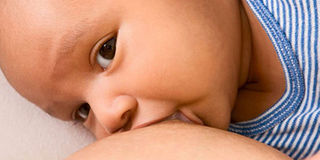Nairobi set to establish breast milk bank at Pumwani

Breast milk. PHOTO | FILE | NATION MEDIA GROUP
What you need to know:
- It is estimated that the bank will help prevent at least 10 per cent of the neonatal deaths when established.
- Many women view breast milk as the best food for children, but still have valid concerns about the safety of donated milk.
Pumwani Maternity Hospital in Nairobi County is set to establish a breast milk bank, which will be the first of its kind in the country.
Plans are under way to bring the milk bank to the city as a joint initiative between the Ministry of Health and an NGO, Program for Appropriate Technology in Health (Path).
Speaking at the hospital during the launch of the World Breastfeeding Week last week on Thursday, Governor Mike Sonko said the facility would set up a breast milk bank to help babies who cannot get breast milk from their mothers for reasons such as death, poor health or absence.
“Pumwani, which was accredited by WHO as a baby-friendly hospital in 1992, is a regional hub of excellence in the care of premature babies and is preparing to establish the first breast milk bank at this very hospital,” Mr Sonko said.
CHILD DEATH
Health Cabinet Secretary Sicily Kariuki, who was the function’s chief guest, said the government would implement the provisions for establishment of breastfeeding centres in firms as spelled out in the 2017 Health Act.
“Breastfeeding is a low-cost and high-impact practice that reduces the number of babies who die.
"Mothers should adopt the World Health Organization guidelines to exclusively breastfeed for the first six months of a baby’s life.
"This should be followed by continued breastfeeding coupled with the introduction of other foods until the child is up to two years and beyond,” she said.
Some 39,000 babies die every year in the country due to neonatal complications. It is estimated that the bank will help prevent at least 10 per cent of the neonatal deaths when established.
SAFETY
Ms Kariuki said her ministry would set the pace by setting up a breastfeeding station at Afya House headquarters in Nairobi.
“Breastfeeding is a baby’s first vaccine and the best source of nutrition. It is therefore a universal solution that lays the foundation for good health and survival for children,” she said.
The WHO has recommended that countries facilitate and expand the use of donated human milk to make it more available and accessible to babies in need.
Scientific findings and WHO recommendations aside, public doubts on the suitability of donated breast milk still persist.
According to an unpublished study carried out in Nairobi in 2016-2017 by Path and the African Population Health and Research Center (APHRC), many women view breast milk as the best food for children, but still have valid concerns about the safety of donated milk.
Chief among the women’s concerns is breast milk’s ability to pass HIV to suckling infants.
More than 500 human milk banks have been established in 37 countries around the globe including South Africa, India, France, Japan Brazil and Canada.





